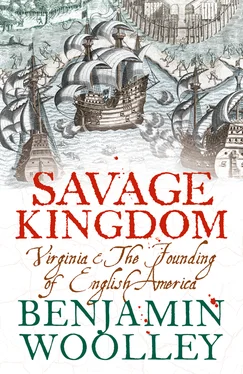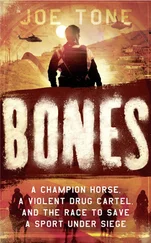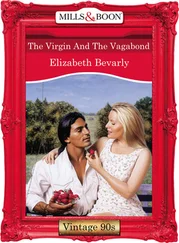In these dangerous times, a villager of Powhatan, Wahunsunacock, grew great in stature from these wars and encounters, and came to be chief of weroances , the mamanatowick , with power to save Tsenacomoco in these troubled times. 15
Wahunsunacock understood the people of other worlds, who called him Powhatan after the place of his origin that lay at the heart of his power. From them, he got more precious things than were had by any other weroance . The touch of the Otasantasuwak became deadly to any who approached them, unless they were by him permitted, be they people in his power, or other people jealous of him.
Under this rule, he fetched copper from the Monacans. 16 From beyond the swamp, in the land of a wise chief impotent in his limbs, he fetched pearls of the purest white, unlike the grains gathered from the Tsenocomoco shores, which were the colour and hardness of rotten teeth. 17
It is said Wahunsunacock had received secret knowledge from the Otasantasuwak of more precious and strange things than any that had ever been known, for which he had prepared the great temple in Tsenocomoco, at the branch of a river atop a red sandy hill among the woods, in a place called Uttamussack.
Wahunsunacock had placed there seven grave men who were the quiyoughcosucks . Their chief was dressed in regalia of a stuffed snake and weasel skins, a cloak and a crown of feathers. Wahunsunacock set these priests over the things he had won, and the bones of his forefathers, and a great rock, which they planted in the ground. 18
At Uttamussack, Okeus was called and in a mighty rage made it known to Wahunsunacock’s priests that from the great bay a people would arise who would overthrow the mamanatowick . So Wahunsunacock declared that the people of the Chesapeake, who lived on an opposite shore of the bay that took their name, were his mortal enemies, for they had been touched by the Otasantasuwak, and so he made them extinct.
But Okeus spoke again. He said Wahunsunacock might overthrow and dishearten attempters and such strangers as should invade his territories or labour to settle amongst his people. He would do this twice, and their tribute of copper, crystal and other precious things that were due to him would make his power even greater. But of a third attempting, these people would defeat him, and he would fall unto their subjection and under their conquest. 19 Then would white clouds of those ghosts blow across the great sea and blank out the sun, and the soft mud would dry, and the trees and plants turn to stone, and all that was supple would become hard, and all the sounds and songs of the Tsenacomoco would become trapped in the black marks upon white leaves.
THE FRAGILE FLEET of three wooden ‘eggshells’ sailed past a cape on the southerly lip of the Chesapeake Bay, and dropped anchor on the south shore. To the north, a vast body of water stretched to the horizon. To the west, low-lying land receded as far as the eye could see. The English had found Virginia. 1
‘There we landed and discovered a little way,’ wrote Percy, who was a member of the first thirty-strong landing party to go ashore that warm spring day in late April 1607. ‘But we could find nothing worth the speaking of but fair meadows and goodly tall trees, with such fresh waters running through the woods as I was almost ravished at the first sight thereof.’
They stayed all afternoon, using the remains of a long day to take in their new surroundings. As darkness fell, they made their way back to the beach. Then, ‘there came the savages creeping upon all fours from the hills like bears, with their bows in their mouths, [who] charged us very desperately’. The English let off volleys of musket fire, which to their surprise the Indians ‘little respected’, not withdrawing until they had used up all their arrows. Gabriel Archer was injured in both his hands, and Matthew Morton, a sailor, was shot ‘in two places of the body very dangerous’. The casualties were carried back on to the boats, and the English withdrew to their ships. 2
Later that evening, there was a solemn gathering of all the leading members of the expedition aboard the Susan Constant . According to their orders from the Royal Council, within twenty-four hours of their arrival at Virginia, they were to ‘open and unseal’ the secret list nominating the settlement’s ruling council, ‘and Declare and publish unto all the Company the names therein Set down’. 3
Newport announced the names chosen by the Royal Council in England. His own was listed first, followed by Wingfield’s and Gosnold’s. Another nomination was John Martin, the sickly son of Sir Richard, a prominent goldsmith and the Master of the Mint. Martin’s election was probably a foregone conclusion, given the wealth of his family and their generosity as patrons of this and other ventures. 4
More surprising was the appearance of the mysterious George Kendall and John Ratcliffe on the list, together with Captain John Smith. The latter’s inclusion might have suggested his immediate release from the brig, but Newport decided to keep him there for the time being.
George Percy and Gabriel Archer were not nominated. Percy may have been excluded because of worries about the loyalty of his brother, the Earl of Northumberland. The reasons for excluding Archer, who had worked so hard with Gosnold to promote the venture in its early years, were more opaque, and he took the news badly.
The council’s first job was to nominate a president, who would supervise the taking of the oath of office. But rumbles of recrimination, puzzlement about the roles of Ratcliffe and Kendall, and the difficulty of deciding what to do about Smith discouraged such finalities.
The following day the mariners brought up from the hold the expedition’s collapsible three-ton barge or ‘shallop’, and started to assemble it. Meanwhile, a landing party continued reconnoitring the surrounding territory. Several miles inland, they spotted smoke. They walked towards it, and came upon a campfire, still alight with oysters roasting on a barbeque. There was no sign of the picnickers, so the English polished off the meal, observing as they licked their fingers that the oysters were ‘very large and delicate in taste’. 5
The next day, 28 April, the shallop was launched, and Newport, together with a group selected from the ranks of the ‘gentlemen’, set off in search of a river or harbour suitable for settlement. The only map they had was one based on explorations made during the Roanoke expedition of 1585. This showed the south shore of the bay as interrupted by a series of inlets, one leading to the village of Chesapeake, the other to ‘Skicoac’. The shoreline ended at what appeared to be the mouth of a river, which flowed west. The river’s northern bank was a peninsula, which was marked with a dot, indicating an Indian settlement. To the north of the peninsula was another river, flowing north-west. Along the top of the map was what appeared to be the northern shore of the bay, populated by two villages, ‘Mashawatec’ and ‘Combec’.
What they might have imagined to be the inlet leading to Skicoac proved to be nothing but shoal water, barely suitable for their shallop, let alone a ship. As they coasted deeper into the bay, they apparently passed the first river mouth, and came to the peninsula. They disembarked on one of the beaches, and explored its perimeter. They found a huge canoe, 45 foot long, made from the hollowed-out trunk of a large tree. They also found beds of mussels and oysters ‘which lay on the ground as thick as stones’, some containing rough pearls. 6
Exploring inland, they found the land became more fertile, ‘full of flowers of divers kinds and colours,’ remarked Percy, ‘and as goodly trees as I have seen, as cedar, cypress, and other kinds’. They also found a plot of ground ‘full of fine and beautiful strawberries four times bigger and better than ours in England’. Great columns of smoke could be seen rising from the interior, and they wondered anxiously whether the Indians were using fires to clear land for planting, or ‘to give signs to bring their forces together, and so to give us battle’.
Читать дальше












